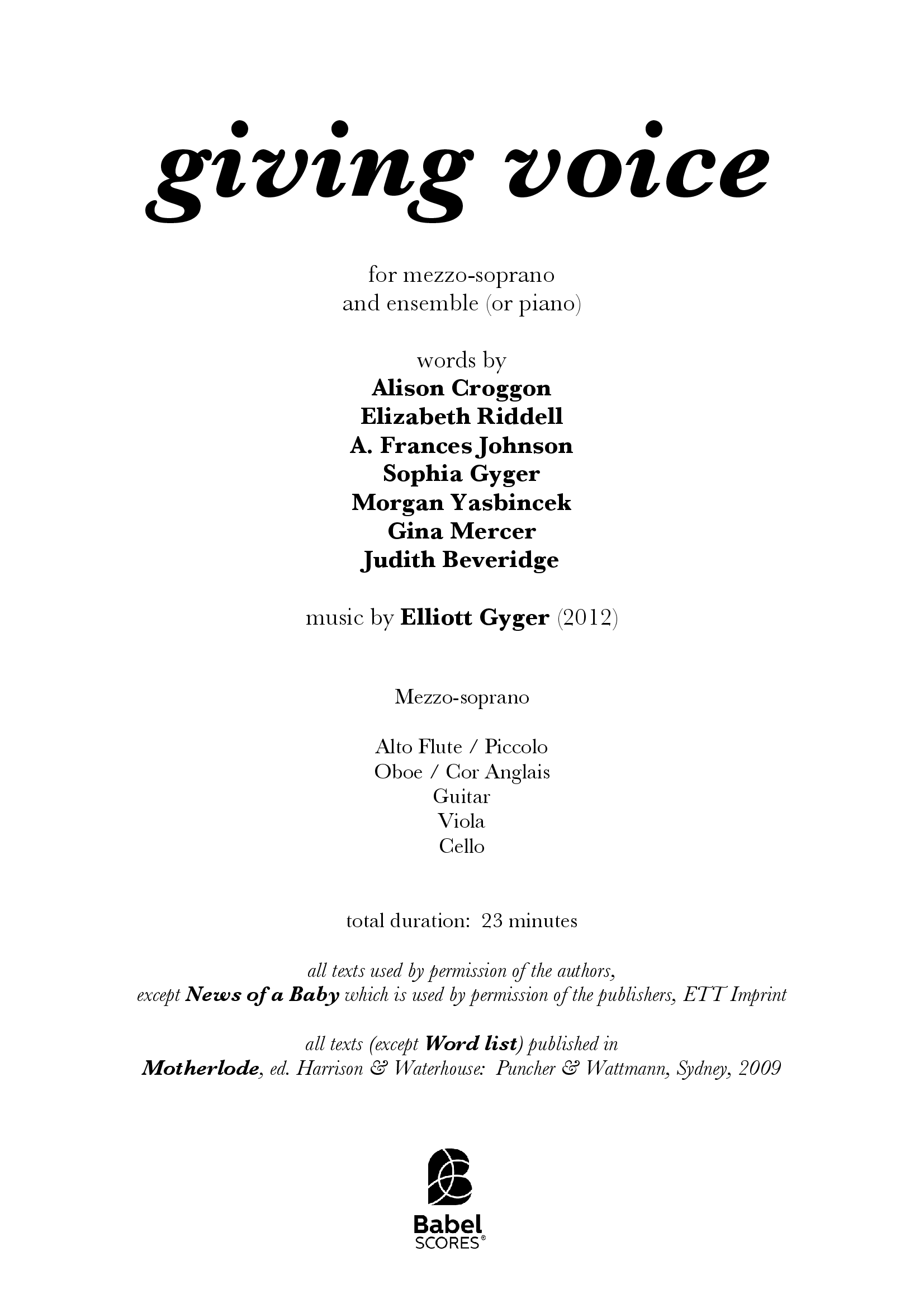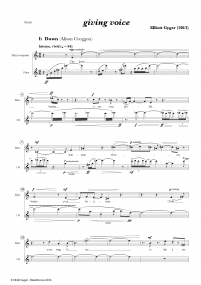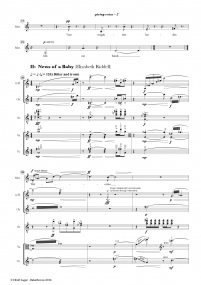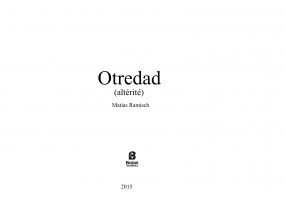Recherche avancée
giving voice
for mezzo soprano and ensemble
12,36 €
Version papier (+16,20 € impression et livraison ). Colissimo7-14 days aprox.
Version numérique (+0,00 €) à télécharger
Chez BabelScores, quand vous achetez une partition, vous pouvez ensuite contacter directement le compositeur ici même !
Caractéristiques
Region
Oceania
Estimated Duration
6 - 10min
Date
2012
ISMN : 979-0-2325-1788-9
Notes sur cette pièce
giving voice is my first work for Halcyon featuring a single singer, mezzo-soprano Jenny Duck-Chong, and takes the form of an intimate song cycle on the theme of early childhood. With one exception, the texts come from a wonderful 2009 anthology of poetry by Australian women entitled Motherlode, and are written from the parental point of view. The ideas they treat are universal: the responsibilities and anxieties of parenthood, and the limitless potential – and uncertainty – of a new human life. An important secondary thread, reflected in the work’s title, is the idea of voice and speech, from the wordless cry of the newborn, through the acquisition of language, to the voice as a symbol of emerging identity. As a foil for the cycle’s flights of parental eloquence, it seemed important that the child’s own voice be represented as well, this takes the form of a selection from my daughter Sophia’s emerging vocabulary (verbal and gestural) when she was a toddler.
While there is no specific narrative implied, the eight songs are arranged in approximately chronological order, with the first four concentrating on infancy and the last four on the growth and development of the next few years. The ensemble of five players is differently configured for each song, from solos to the full quintet, and with woodwind doublings contributing to timbral variety. The musical materials grow out of a series of 6-note chords, all playable on the guitar, which are presented in full as the basis of the fifth song, each song builds its own selection and ordering of the chords into a self-contained miniature structure, although there are also melodic cross-references between songs. Another recurrent element is the use of silence, which is here never the passive absence of sound, but powerfully active: the silence of waiting, or listening, or searching for the next utterance – verbal or musical.
In the first song, the oboe represents the “single cry” of the newborn child, which is “the axis” on which the lives of the parents hinge: nothing can ever be the same again. News of a Baby is an ironic reflection on the perilous and hostile world awaiting the child, set as a strident, mocking fanfare supported by the whole ensemble. Fontanelle, a tenderly playful meditation on the word for “the gentling seal between two halves of a newborn cranium”, contains many verbal and musical symmetries, including the return of the opening vocal line in the alto flute, added to the viola/cello duet which accompanied the first half. The first half of the cycle closes with an echo of the first song, once again the accompaniment is a single line, this time for alto flute, here suggesting the rise and fall of a sleeping child’s breathing.
The fifth song enacts the acquisition of language, assembling a musical vocabulary piece by piece from tiny elements, involving harmony, rhythm and instrumentation. The beautiful but enigmatic poem the stars is set to a nocturnal soundscape of guitar harmonics and low piccolo, subsumed into the overtones of the cello’s low C. In Hurdy Gurdy the child’s voice is most obviously suppressed, being implied but omitted from the soloist’s frenetic recitation, which will be all too familiar to many parents and children … In the final song, the singer views the solitary child not as a helpless innocent needing protection, but as an emergent individual like herself, the accompaniment consists of overlapping and interweaving solo lines, including natural harmonic glissandi evoking the sound of a creaking swing.
giving voice was judged the winning work in the 2013 Paul Lowin Song Cycle Award.
Ajouter à une playlist
- Identifiez-vous pour créer une liste
While there is no specific narrative implied, the eight songs are arranged in approximately chronological order, with the first four concentrating on infancy and the last four on the growth and development of the next few years. The ensemble of five players is differently configured for each song, from solos to the full quintet, and with woodwind doublings contributing to timbral variety. The musical materials grow out of a series of 6-note chords, all playable on the guitar, which are presented in full as the basis of the fifth song, each song builds its own selection and ordering of the chords into a self-contained miniature structure, although there are also melodic cross-references between songs. Another recurrent element is the use of silence, which is here never the passive absence of sound, but powerfully active: the silence of waiting, or listening, or searching for the next utterance – verbal or musical.
In the first song, the oboe represents the “single cry” of the newborn child, which is “the axis” on which the lives of the parents hinge: nothing can ever be the same again. News of a Baby is an ironic reflection on the perilous and hostile world awaiting the child, set as a strident, mocking fanfare supported by the whole ensemble. Fontanelle, a tenderly playful meditation on the word for “the gentling seal between two halves of a newborn cranium”, contains many verbal and musical symmetries, including the return of the opening vocal line in the alto flute, added to the viola/cello duet which accompanied the first half. The first half of the cycle closes with an echo of the first song, once again the accompaniment is a single line, this time for alto flute, here suggesting the rise and fall of a sleeping child’s breathing.
The fifth song enacts the acquisition of language, assembling a musical vocabulary piece by piece from tiny elements, involving harmony, rhythm and instrumentation. The beautiful but enigmatic poem the stars is set to a nocturnal soundscape of guitar harmonics and low piccolo, subsumed into the overtones of the cello’s low C. In Hurdy Gurdy the child’s voice is most obviously suppressed, being implied but omitted from the soloist’s frenetic recitation, which will be all too familiar to many parents and children … In the final song, the singer views the solitary child not as a helpless innocent needing protection, but as an emergent individual like herself, the accompaniment consists of overlapping and interweaving solo lines, including natural harmonic glissandi evoking the sound of a creaking swing.
giving voice was judged the winning work in the 2013 Paul Lowin Song Cycle Award.
Instrumentation
Oboe|Mezzo-soprano voice
Score Details
Format - A4 / US Letter
Pages - 74
Pages - 74
Pièces similaires





